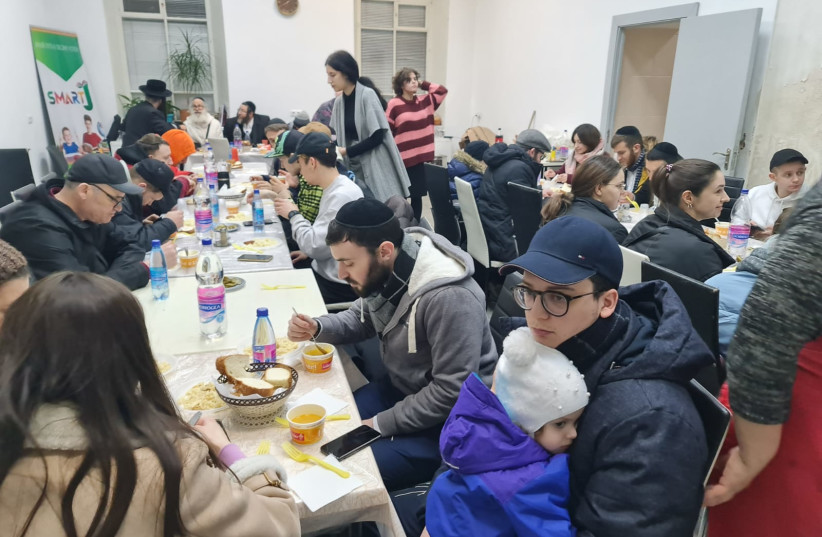A survey of 600 members of Jewish communities across Ukraine reflects sincere concern as the country heads into the second winter of its ongoing war with Russia.
As we approach nine months since the beginning of the war in Ukraine, the impact on the civilian population continues to rise, particularly as the harsh winter months get underway.
The International Fellowship of Christians and Jews (IFCJ) survey says that almost three-fourths (73%) of them expect that they will have to choose between heating their home and food purchases in order to meet the financial needs of the winter.
Almost all (97%) of Ukrainian Jews claim that the war has brought difficulties in their ability to heat their home for the winter, with more than two-thirds (68%) saying that they don’t know if they will be able to do so at all and almost half (47%) saying that they know at least one person who will not be able to. And half of the respondents said that they don’t believe they have enough warm clothing for this winter.
The survey was conducted among 600 current and former Jewish residents of Ukrainian cities including Kyiv, Odessa, Lviv, Dnipro, Chernihiv, Zhitomir, Cherkasy and more via phone and written questionnaires.

“In light of this survey’s findings, and with the help of our more than 600,000 dedicated donors, we have every hope that the additional support will help the local Jewish community prepare and cope with the cold winter months ahead.”
IFCJ President Yael Eckstein
In response to the growing need, the IFCJ announced that they will be transferring $6.5 million worth of assistance to organizations working on the ground with local Jewish communities. The financial support will be invested in providing food and medicine supplies for tens of thousands of the elderly and children, hot meals, space heaters and other means of staying warm in the cold weather in Ukraine, as well as food and supplies for refugees in neighboring countries.
What has the organization done so far for Ukrainians?
SINCE THE outbreak of the war, the organization has been instrumental in Ukraine evacuating members of the Jewish community, providing food, medicine and supplies as well as establishing a support and aid hotline. IFCJ has distributed $23 million in emergency support for the Jewish community in Ukraine as well as helping to facilitate 4,500 new immigrants coming to Israel. Including additional aid and funding to support those in FSU countries, the fellowship has contributed over $30 million since the outbreak of the war.
“Since the outbreak of the war, the IFCJ, through the dedicated work of our partners on the ground, has been actively helping the Jewish communities in Ukraine – those who have remained and those who have chosen to immigrate to Israel through the immigration service we set up in Kishinev,” said its president Yael Eckstein. “In light of this survey’s findings, and with the help of our more than 600,000 dedicated donors, we have every hope that the additional support will help the local Jewish community prepare and cope with the cold winter months ahead.”
Shlomi Peles, CEO of Chabad’s network of emissaries and their Jewish Relief Network Ukraine, said that, “Thanks to the partnership with IFCJ, and the many volunteers who work tirelessly in the field, no family or elderly Jewish resident will be left to fend for themselves this winter.”
The Jewish Federations of North America (JFNA) also announced last week that it raised $3 million for a package to support the high costs of aliyah (immigration) to Israel from Russia, Ukraine and Belarus, it announced.
Since the beginning of the war, 52,500 new immigrants have arrived in Israel from these countries with the aid of JFNA’s partner, the Jewish Agency for Israel. Responding to widespread power outages and preparing for what is projected to be a worsening humanitarian crisis this winter in Ukraine, JFNA is allocating $4m. for Ukraine, focusing on emergency winter relief.
In addition to providing humanitarian aid for refugees, the federations have successfully advocated for the expansion of refugee resettlement in the US, operating a $1m. Ukrainian Resettlement Grant Initiative with matching funds from the Shapiro Foundation.
“The winter forecast in Ukraine is extremely concerning, with the potential for an even graver humanitarian crisis, and our latest allocation reflects our attention to the evolving needs on the ground and our ongoing commitment to providing relief where it is most needed,” JFNA president and CEO Eric Fingerhut said.
